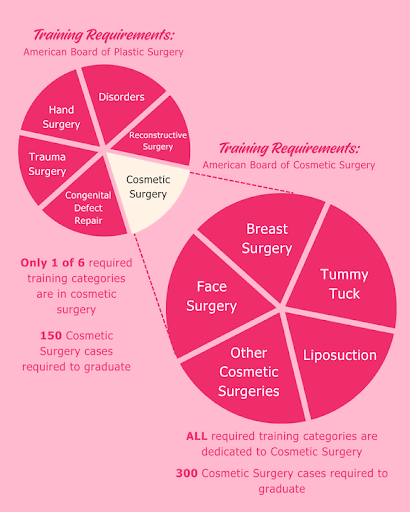By Dr. Gina Maccarone, MD, FACS, FAACS

One of the most common questions I hear in consultations is, “What’s the difference between plastic surgery and cosmetic surgery?” It’s a great question, and an important one. While the two fields are closely related and even share some techniques, they differ significantly in their training, purpose, and the types of outcomes they aim to achieve. If you’ve ever been confused by these terms, you’re not alone, and understanding the difference can help you make better, more informed decisions for your body and goals.
Let’s start with plastic surgery. Plastic surgery is primarily reconstructive in nature. It focuses on restoring function and normal appearance after trauma, surgery, illness, or congenital defects. Common procedures in this category include breast reconstruction following mastectomy, cleft palate repair, skin grafts for burns, and scar revision. These surgeries are often medically necessary and may even be life-changing, helping someone regain use of a limb, recover from cancer, or restore symmetry after an accident. Because of their medical necessity, many plastic surgery procedures are covered by insurance.
That said, cosmetic surgery is entirely elective and centers around enhancing a person’s appearance. These procedures are chosen by individuals who want to improve or refine a particular feature, whether that’s a more sculpted waistline, a more youthful-looking face, or lifted, balanced breasts. Examples include facelifts, breast augmentation, liposuction, tummy tucks, and body contouring. While these procedures aren’t medically necessary, they can have a profound impact on a person’s confidence and sense of self. Cosmetic surgery is where art and science truly intersect, and that’s where I’ve dedicated my entire surgical career.

Comparison of training requirements for cosmetic surgery vs. plastic surgery
As a triple board-certified cosmetic surgeon, my training was focused entirely on aesthetics, how to shape, refine, and enhance features in a way that looks natural, balanced, and beautiful. While both plastic and cosmetic surgeons are highly trained professionals, not all plastic surgeons receive extensive training in aesthetic techniques. In fact, according to the American Board of Cosmetic Surgery, plastic surgery training includes six core categories, but only one focuses on cosmetic procedures, with just 150 required to sit for certification. In contrast, cosmetic surgery training is fully dedicated to aesthetics, requiring completion of at least 300 cosmetic procedures across five specialized categories. This difference in training depth and focus is why I always encourage patients to look beyond titles and review a surgeon’s credentials, surgical outcomes, and area of expertise to ensure their goals are truly aligned (American Board of Cosmetic Surgery, “Cosmetic Surgery vs Plastic Surgery”).
One of the biggest myths I try to dispel is that cosmetic surgery is about chasing perfection. That couldn’t be further from the truth. It’s about alignment, about helping the outside reflect how someone feels on the inside. Whether it’s restoring a sense of femininity after childbirth, reclaiming confidence after weight loss, or simply choosing to age on your own terms, cosmetic surgery is a deeply personal decision. And it deserves to be approached with compassion, clarity, and respect.
So, how do you know which type of surgery, or surgeon, is right for you? Start with your goals. If your needs are medically driven or involve restoring basic function, a board-certified plastic surgeon with reconstructive experience may be the right choice. If your goals are aesthetic, focused on contour, lift, symmetry, or rejuvenation, you may benefit more from working with a board-certified cosmetic surgeon who specializes in those techniques. And sometimes, patients need both perspectives, which is why collaborative care is so valuable in this field.
Another key consideration is the experience you want as a patient. In my practice, cosmetic surgery is never a one-size-fits-all experience. Every consultation begins with listening, understanding your concerns, your lifestyle, and your vision for yourself. From there, I craft a fully customized treatment plan that balances artistry, medical safety, and long-term satisfaction. My job isn’t just to perform a procedure. It’s to walk with you through the journey and help you feel confident, cared for, and in control.
At the end of the day, the labels, plastic vs. cosmetic, matter less than the person behind them. What matters most is that your surgeon is deeply trained in the area that matches your goals, is transparent about what’s possible, and is fully committed to your safety and outcomes. Whether you’re considering surgery for functional reasons or personal empowerment, you deserve to be supported with honesty, compassion, and skill. If you’re ever unsure, start with a conversation. I’m here to guide you every step of the way.
Xo,
Dr. G
